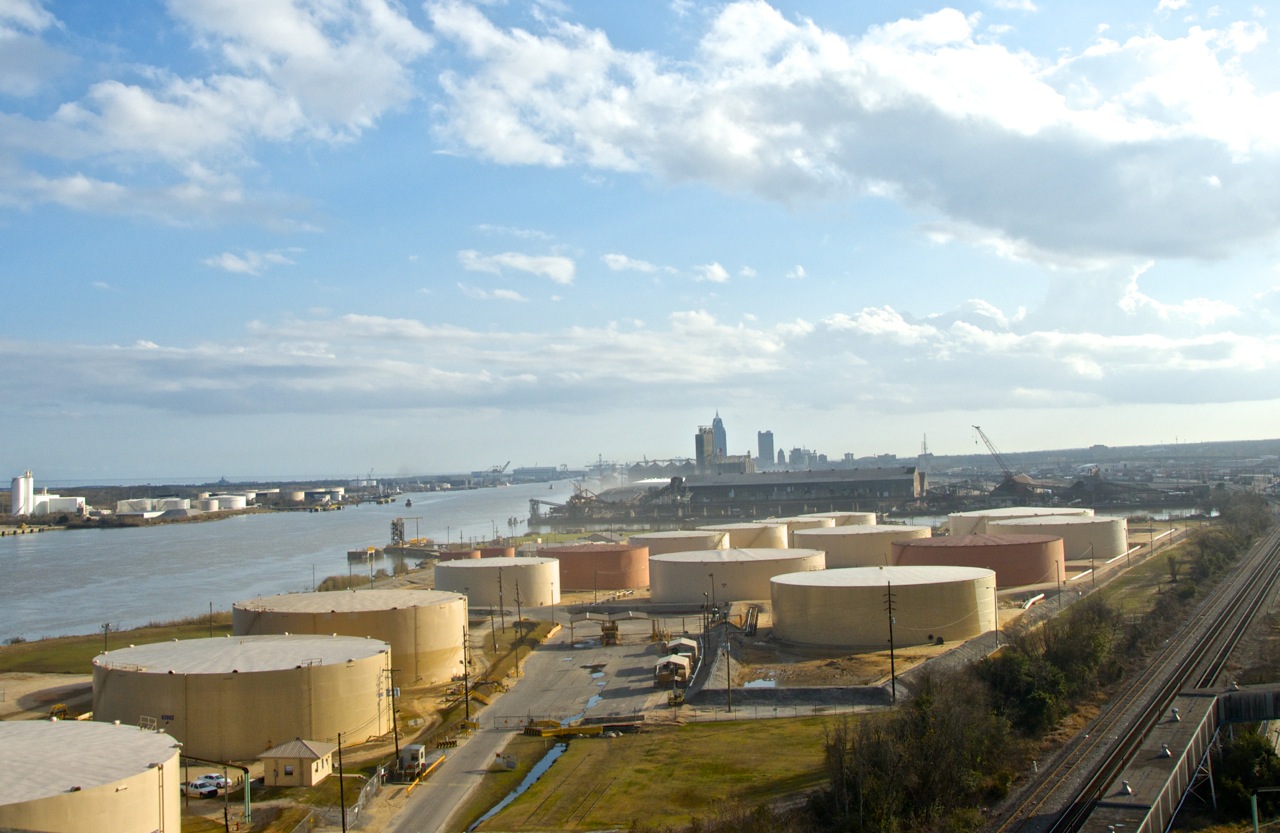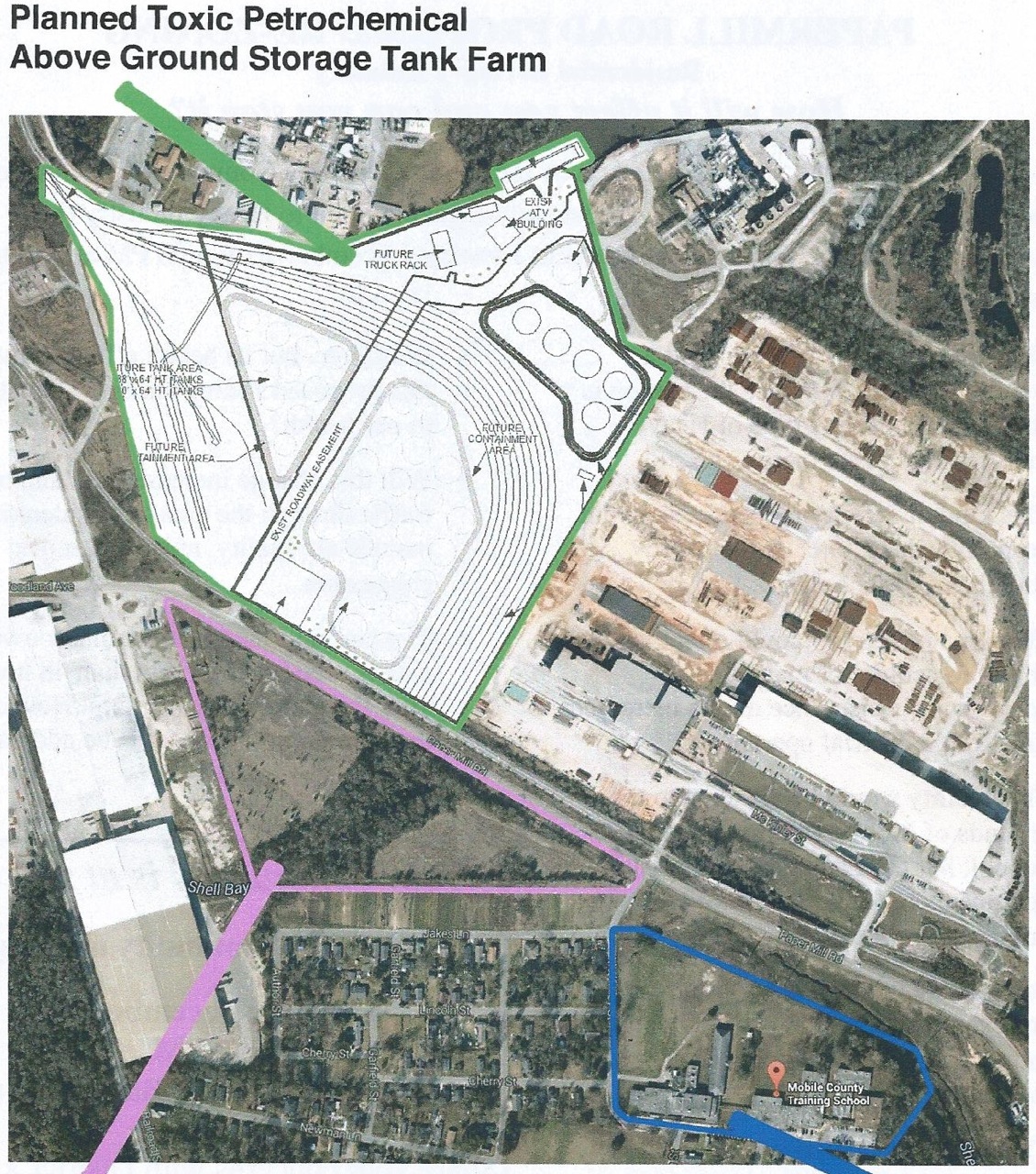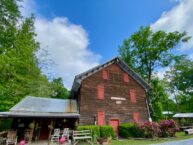By David Underhill –
MOBILE, Ala. – The tank farms became a hot potato, singeing any official who touched them.
Residents near sites for new or expanding tank farms fired complaints at the city’s planning commission, which readily tossed the heated hassle to the city council. A majority poised to pass a moratorium on construction of tank farms, until promoters of these projects maneuvered to whittle away that majority.
That spawned a citizens’ committee to study the issue and make recommendations to the planning commission, which appointed a subcommittee to receive these recommendations. That subcommittee is now juggling the spud before lobbing it back to the full planning commission, which will fling it again to the city council, which will … who knows.
Last week the subcommittee’s three members met to ponder. Joining them were the planning commission’s lawyer and head staffer. Although this happened in public it wasn’t a public meeting. Citizens could sit and listen but not participate.
The audience sorted themselves, as usual, into factions: the tank farm evangelists in one clump and the unbelievers in another. There were few, if any, neutral observers.
Discussion began with the easy issues: Does the city have satisfactory procedures for deciding whether and where to locate tanks holding hazardous materials? How should the public be informed about impending decisions on these matters? Should the concerns of nearby residents have a prominent role in the proceedings? Can noxious fumes be captured rather than released from tank farms? Must the operators of such facilities provide timely, accurate information to fire departments and other emergency services about dangerous substances on hand?
All agreed that any deficiencies in such issues could be fixed by adjustments to current practices.
Consensus By Garble
Then came the hard part. It was the same item that had flustered the citizens’ committee, which tried to achieve consensus about its recommendations — and largely succeeded — with one contentious exception.
Buffer zones: How broad a safety strip should separate tank farms from homes, schools, churches, hospitals, businesses? The wider the strip the less danger if something goes explosively wrong. But the wider the strip the less land remains for the tanks.
Most of the proposed new and expanding tank farms are squeezed between the waterfront and commercial or residential districts. Broad buffer zones would leave so little land for tanks along the shore that the planned facilities must shrink drastically, perhaps to the vanishing point.
This applies in the north Mobile neighborhood of Africatown, settled by the human cargo from the last slave ship to arrive in the U.S. The huge tank farm intended there would squat between the waterfront and a dense residential area.
Some on the citizens’ committee wanted a setback half a mile wide to protect Africatown. Others, more attuned to industry’s wishes, wanted a lot less.
This conflict strained the quest for consensus and garbled the passages about buffer zones in the committee’s final report. Now the same wrangle vexes the planning commission’s subcommittee and it too has found no easy solution, as the discussion at last week’s meeting revealed.
Consensus By Punting
Nobody on the subcommittee wanted to specify a number for the width of buffer zones. They said projects would differ by location and each should be considered on its own merits. Maybe, they suggested, a minimum width could be required with an option for wider setbacks where warranted by circumstances.
But they shied from saying what that minimum should be. Instead they instructed the staff to produce maps showing the sectors of the city zoned for heavy industry — where tank farms might locate — with surrounding buffers in 500 foot increments. These maps will illustrate where the desires of tank farm developers collide with people living and working within 500, 1,000 or 1,500 feet (and maybe more increments).
And the subcommittee speculated about stretching the buffers with words. Must the setback be measured from the boundary of a tank farm site to the boundary of a nearby residential zone? Or might it be measured from the porch of the nearest inhabited home to the position of the tanks within the site. Then the necessary buffer could be created by moving the tanks to the farthest part of the site and putting offices and other support facilities in the part closest to residences.
The maps will not say what the width of a buffer ought to be or where it should be measured from. The subcommittee will have to decide this and they are not ready to do so. They will meet again next month to study the maps. And they instructed their attorney to draft a prospective report to the full planning commission about any changes their deliberations may require in the city’s zoning or other regulations.
Consensus By Omission
This was a deft juggling of the hot potato. But the subcommittee didn’t dare to even touch the truly searing produce.
They recognized that approving tank farms implies approving the transport of substances to fill those tanks. In Mobile that means trains pulling long, hazardous chains of tanker cars brimming with crude oil. Subcommittee members remarked upon fiery accidents elsewhere by such trains (opponents call them bomb trains and the neighborhoods along their routes blast zones) and fretted about repeats here. But the subcommittee pleaded impotence. They said railroads are regulated by others, who have the responsibility to oversee safety.
But the trains wouldn’t be coming to town without tank farms to receive their cargoes. And the subcommittee, as a branch of the planning commission, does have a say in whether these tank farms exist. Yet the members were hesitant about linking tank farm decisions to dangers from trains.
They have the legal authority to attend to the health and safety of the people. But they acted like their main responsibility is fostering economic development. And they said repeatedly, in various phrasings, that expanding waterfront tank farms equals economic development.
To them, anybody prepared to invest any big wad of money in anything is welcome. They didn’t consider (not out loud, at least) the elementary idea that devoting the waterfront to tank farms prevents other uses of the shoreline that might be more desirable development.
While subcommittee members did note risks from tank farms, they said repeatedly that a balance must be found between economic development and public safety. This might be a valid approach if the benefits and hazards of tank farms were spread evenly across the city. But they are not. The hazards are highly concentrated in certain neighborhoods, and the benefits go mainly to investors elsewhere collecting profits. This is an inherent imbalance.
And if the benefits and hazards were distributed evenly across the community that still doesn’t assure a balance between development and safety. Weighing such a balance assumes that pluses and minuses can be calculated like a mathematical formula and a solution found. But what if circumstances make this impossible? Then the choice isn’t to have both development and safety — it’s one or the other.
Massively deadly chemical (Bhopal, India) and nuclear (Chernobyl, Ukraine; Fukushima, Japan) accidents left ruins surrounded by evacuated wastelands. Nothing comparable has happened yet with petroleum but a couple years ago in Canada an oil tanker train derailed and burned the center of a town (Lac-Megantic, Quebec) to cinders. Scores of residents died. The plans being made for oil storage and transport in Mobile contain the potential for similar or worse disasters. How could that balance development and safety?
The subcommittee made no attempt to balance economic development against the greatest environmental hazard. It was simply ignored. The city already has a throng of large petrochemical storage tanks and the planned expansions would add dozens. Most of these are near the waterfront just a few feet above sea level. The battering waves of a major hurricane could come ashore on a storm surge 20-30 feet deep. And they would bring chunks of debris serving as piercing projectiles.
Loose the contents from just a few of these tanks and the Exxon Valdez and BP’s offshore oil well become footnotes. The story history books will tell is the fate of Mobile’s river and bay.
Is such a catastrophe unlikely? Yes. Is it possible? Yes. Planners need to take this into account. The subcommittee didn’t address it in the slightest.
An Offer They Can’t Refuse?
Another awkward topic ignored was the temptation to evict. Although the subcommittee spoke openly about fashioning buffers by backing dangerous tanks away from the boundaries of industrial zones abutting residential ones, they did not mention the obvious prospect of doing the opposite.
This discussion pertained specifically to Africatown, where a giant tank farm wants to arise across the street from homes. Creating a broad buffer there by pushing the tanks back from the street and toward the water might leave so little land available for tanks that the project dies.
But if the houses are removed then the buffer would be created on the other side of the street, and the tanks could fill the whole industrial tract as originally designed. While the residents might be defiant about clinging to their ancestral homes, what happens when they begin receiving pressure to leave plus attractive prices for selling out?
This would amount to eviction, achieved by financial means. Or legal means might be used. A state’s power of eminent domain has been expanding. Previously the government could compel the sale of private property only for plainly public uses, like highways and parks. Lately private developments like shopping centers and pipelines have been declared public enough for the land they need to be seized under eminent domain. Why couldn’t that reasoning apply to homes located where a tank farm needs a buffer zone?
My Brother’s Keeper?
The tanker trains arriving in Mobile come on the Canadian National railroad from the tar sands mining moonscape of Alberta province. But extensive tar sands strata underlie north Alabama. Prospectors are taking technical and regulatory steps toward extracting these deposits.
Activists in Mobile assume the motive behind much of the urge for expanding tank farms is to hold tar sands coming by train from upstate for transfer into ships. In that case, local officials who allow tank farm expansion are also allowing large swaths of the mining region to be gouged and polluted — because those tar sands won’t be mined unless the output can get to market by boat.
If the planning commission’s subcommittee cared about this they should have said so. They didn’t. Their decisions will influence whether north Alabama becomes a replica of wrecked Alberta. But they behaved like they care about nothing except the benefits or detriments inside the Mobile city limits.
In this loudly Christian area their attitude was: Hell, no! I’m not my brother’s keeper. Eff them. I’m looking out for me.
This myopia is especially astonishing in a port that will drown when the oceans rise. Continuing to dump annual megatons of greenhouse gasses into the air by burning fossil fuels will melt the polar ice and flood every seafront.
Even if all the tank farms anticipated here are built, Mobile’s contribution to this tonnage will be trivial. Every separate place’s will be trivial.
Just as during World War II in the U.S. everybody with a yard was expected to have a Victory Garden, and nobody’s individual Victory Garden won the war. Perhaps not even all the Victory Gardens together freed enough cropland to feed the soldiers. But these gardens displayed purpose and resolve. That’s what Mobile’s refusal to host more fossil fuel tanks would do.
Yet the subcommittee acted like they don’t care to be even their own port city’s keeper. In Florida, at least, officials have an excuse for such behavior. The governor has ordered them to delete from their vocabularies all such terms as global warming, climate change, melting icecaps, rising seas.
In Mobile officials do this voluntarily. Perhaps their silence springs from fear of political retribution if they acknowledge that those global trends result from fossil foolishness. But even if these officials stand among the dwindling corps who sincerely deny the obvious, they still ought to address it.
This has become a subject that no longer submits to silence. Too many people have become too anxious about it for deniers in authority to merely ignore it. They need to address it, if only to swat it aside. But the subcommittee said nothing.
When this issue reaches the full planning commission, they also will be tempted to maintain a politically safe silence. Then the city council.
To avoid singeing their fingers on the hot potato, they will let the planet continue to cook.
Imagine the reaction if they said instead that they will not permit the expansion of tank farms on the Mobile waterfront. And challenged all other port cities to do the same.
It would be a revolutionary act. Also sane and healthy.
















